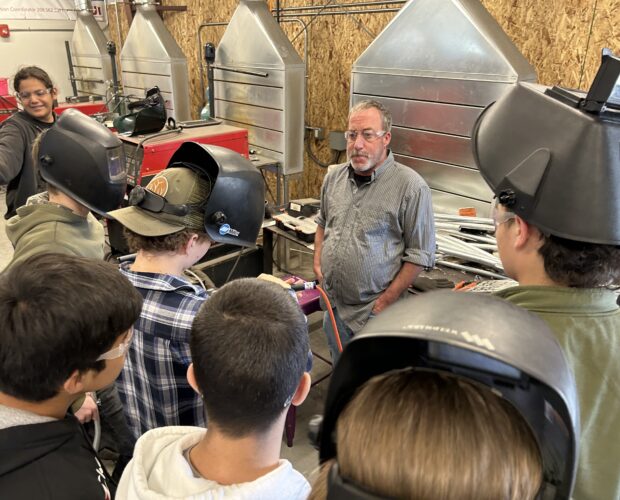Idaho’s $45 million push to expand workforce-ready education programs into rural parts of the state is moving rapidly — about three-fourths of the grant money has been awarded to 35 programs.
Applications for the Idaho Career Ready Students (ICRS) grant program opened four months ago and state leaders have awarded a total of approximately $35 million. The grant money targets new or expanding career technical programs focused on in-demand careers.

On Monday, the ICRS council announced its newest round of recipients: 22 plans and programs were awarded $19 million. In total, 108 applications were received in the past four months, with requests surpassing availability by $66 million.
“When we see $111 million in requests from our districts and charters, it definitely underscores the demand for CTE and the difference that this program can make for communities across Idaho. As these programs grow and mature, they will support students’ career prospects while also addressing the state’s workforce needs,” said Superintendent Debbie Critchfield.
The idea is to allocate a portion of the grant money to build up programs that will train graduates to meet the needs of local industries. In the Panhandle, that means timber products. Approximately $2.4 million of the latest grant money awarded this week is aimed at that target.
The following grants were awarded to fund new forestry and natural resources programs:
- Orofino Joint School District was awarded up to $528,100 to fund the natural resources and forestry pathway at Orofino Jr./Sr. High School and Timberline Schools.
- West Bonner County School District was awarded up to $725,240 to fund the CTE natural resources pathway at Priest River Lamanna High School.
- St. Marie’s Joint School District was awarded up to $1.2 million to fund a forestry and auto mechanic program at St. Marie’s High School.
Priest River students interested in a forestry career will soon have an opportunity to pursue their career passion. The school’s $725,240 grant includes approximately $208,000 for equipment and $516,000 for a new 4,000 square foot facility.
With the money, Jared Hughes, a Priest River natural resources and forestry teacher, plans to develop a new CTE pathway for grades 7-12: forestry science and management; forest products operations and production; wildlife ecology and management; geographic information system, global positioning system, drones and mapping.
According to Hughes, the school will also be working with industry partners to:
- Provide learning and internship opportunities not currently available to students.
- Develop skills and certifications in conjunction with the industry partners to speed up the development of work-ready students.
- Increase average daily attendance by providing more hands-on, kinesthetic learning opportunities that appeal to non-traditional students.
- Increase the graduation rate. Having more opportunities in multiple CTE pathways will hopefully motivate more students to stay in school.
“West Bonner is immensely grateful to the ICRS council for its approval of our proposal,” Hughes said in a press release.

Approximately $17.4 million was awarded for capital projects in the following districts:
- Blackfoot School District was awarded up to $3,898,071 to fund the Blackfoot Technical Education Center.
- Sugar Salem School District was awarded up to $2,700,000 to support the Sugar-Salem Regional CTE Facility.
- Soda Springs Joint School was awarded up to $370,960 to fund a multi-program CTE facility at Soda Springs High School.
- New Plymouth School District was awarded up to $2,272,799 to fund a new agricultural education building at New Plymouth High School.
- Cascade School District was awarded up to $16,361 to fund HVAC and electrical upgrades to the agricultural welding shop at Cascade High School.
- Firth School District was awarded up to $103,299 to fund agricultural shop upgrades at Firth High School,
- Hansen Middle School District was awarded up to $71,309 to fund an animal science pathway Facility at Hansen Jr./Sr. High School.
- Middleton School District was awarded up to $1,124,800 to fund a construction and auto technician program at Middleton Academy.
- Fremont County Joint School District was awarded up to $253,120 to fund a greenhouse initiative at South Fremont High School.
- Jefferson School District was awarded up to $5,800,000 to fund a CTE expansion at Rigby High School.

The following grants were awarded to support existing programs:
- Canyon Owyhee School Service Agency (COSSA) was awarded up to $56,721 to fund automotive and diesel program equipment upgrades at the COSSA Regional Technology and Education Center.
- Whitepine Joint School District was awarded up to $47,871 to fund multi-program equipment upgrades at Deary School.
- Mullen School District was awarded up to $61,248 to fund welding program upgrades at Mullen High School.
- Oneida Joint School District was awarded up to $28,622 to fund its CNC plasma system at Malad High School.
- Council School District was awarded up to $23,000 to fund a request for agricultural facility equipment upgrades at Council High School.
- Wallace School District was awarded up to $23,440 to fund welding and wood shop equipment upgrades at Wallace Jr./Sr. High School.
- Castleford School District was awarded up to $22,250 to fund welding program upgrades at Castleford Schools.
- Marsh Valley School District was awarded up to $32,617 to fund welding program upgrades at Marsh Valley High School.
- Bear Lake School District was awarded up to $17,195 to fund automotive technology equipment upgrades at Bear Lake High School.
School districts and charters can apply for the funds here. The ICRS program was approved by the Legislature earlier this year and signed into law by Gov. Brad Little on March 31. Questions can be directed to program coordinator Allison Duman at [email protected].
